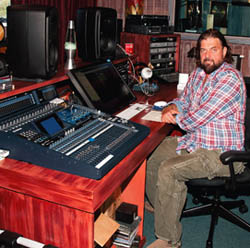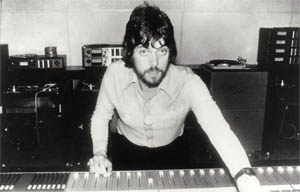In an exclusive interview with CE Pro, Alan Parsons, renowned sound engineer for Pink Floyd’s Dark Side of the Moon and for the Beatles, says hi-fi pros focus too much on equipment and brand names, when they should put more energy into room acoustics. He also says some surround-sound systems from Costco and Walmart “really aren’t that bad.”
All this from the audio wizard behind Dark Side of the Moon, and the name sake of the Alan Parson’s Project?
Parsons broke into the music industry in the late 1960s when he was hired by Abbey Road Studios to work as an assistant engineer. As an assistant engineer, Parsons’ career started at a point where most people music lovers only dream of reaching – working on the last two Beatles’ albums.
As a full-fledged engineer, Parsons worked on projects with Paul McCartney and the Hollies, but it was his efforts on the benchmark album Dark Side of the Moon that launched his career.
Throughout the rest of the 1970s and 1980s, Parsons released several albums under the name of Alan Parsons Project (APP). The 1990s marked a shift in direction for Parsons that was highlighted by his dropping of “Project” from his band name.
As he entered the 2000s, Parsons continued to release new music, which includes his first foray into the electronica genre when he released 2004’s A Valid Path. Parsons’ latest project is an instructional DVD package entitled The Art and Science of Sound Recording. The multi-disc DVD set is designed to educate music engineering students and music enthusiasts about the technologies and techniques that are driving the recording industry.
Robert Archer: Your career has spanned decades and it includes your work with The Beatles and Pink Floyd. Back when you worked with these artists, what did you learn from them that you still find useful today?
Alan Parsons: You couldn’t ask for anything better than those projects. I learned a lot from George Martin and I also learned the art of engineering from some of the best engineers at EMI/Abbey Road. Every session was an experience that I could say to an extent was an influence.
If you had the digital tools of today available to you when you were making Dark Side of the Moon would you have done anything differently?
I think it was a sonic statement of the available technology of the time. It’s a difficult question to answer. Had digital processing been available then, it may have been different; certainly some of the effects would have been easier to create. I think it was a well written and executed album and we all did a good job; we were a good team and made a good album.
How do you separate music listening in terms of your profession and as a pastime of entertainment?
I don’t listen to much music recreationally – it’s almost always for professional applications. I do listen in the car, but that’s about it.
Do you have any advice for those that would like to develop their professional listening skills to hear things more like audio professionals such as yourself?
The art of listening is the key to any kind of career in this business. My training at EMI/Abbey Road was thorough in how to listen. I learned how to discern minute differences in pieces of equipment, and it helped me to appreciate what I was hearing. As you become experienced on a pro level you become fussier about how things sound and how certain pieces of equipment behave.
You’ve been on record as saying that surround sound offers listeners a much more immersive experience for music. Can you clarify/explain why you feel this way?
Yes, I think it’s surprising that it hasn’t taken off. Back in the 1970s, the science of producing four channels of music for vinyl was very inadequate. Now that we have the technology to do 5.1 surround, I wish there was more interest in using it for music as well as film. Not enough music people are interested in it. Surround is to stereo what stereo was to mono; it makes a huge difference.
What do you think about the market evolution that has seen the CD format losing sales while the vinyl and digital download categories increasing their respective sales?
I’m not sure vinyl is selling beyond audiophile purists, and I’m not really one of them. I’m reasonably happy with the quality of CDs, but I’d really like to see high-resolution downloads become more widely available.
It is encouraging to see people listening to high-resolution audio. Eventually it’s going to be an all-download world … computers dominate our lives these days. We are just going to have to be tolerant of the longer download times. It’s just the way it is.
Do you think that sound quality is driving this trend? Are people tiring of low-resolution sound and compressed recordings that lack dynamic range?
That may well be. The majority [of consumers] are happy with MP3, but they don’t know what they are missing. Being fast and free are priorities, and that’s why MP3 is popular. There’s another damaging situation: You can complain about iTunes and subscription sites being damaging to copyright owners and having inferior audio quality, but one of the worst culprits is YouTube.
You can look for any record ever made and it’s on YouTube for free – usually with crappy audio – and let’s not even mention the video content that’s out there to go with it. I sense there will be a huge copyright court case over the content on YouTube someday.
















